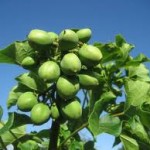A study conducted by Mildred Fidel, chief science research specialist of Technical Services Division of the Department of Science and Technology’s Forest Product Research and Development Institute (FPRDI) based in Los Baños, Laguna, Philippines.
Seed wastes of Jatropha or tuba-tuba as it is commonly called in the Philippines, can be processed and converted into glue mixes that can be a substitute a portion of formaldehyde based commercial adhesives for plywood.
The plywood glue mix from seed waste, a jatropha byproduct from oil extraction, is comparable alternative to urea formaldehyde and phenol formaldehyde which are the commercial adhesives for interior and exterior plywood, respectively.
Both urea and phenol formaldehyde are imported petroleum based chemicals which are used by the local plywood mills. The use of these chemicals can pose a health hazard to users because of the emission of formaldehyde in the process, their use are now banned in the United States, Europe and Japan.
According to Fidel, there are two types of glue mixes from jatropha seed wastes: The powdered glue mix which can be made by drying the seed waste residue and then grinding it; and the protein hydrolysate that can be extracted by cooking the seed waste in water and the use of filter.
Both the jatropha powder and protein hydrolysate glue mixes can be readily incorporated by plywood mills for their adhesive requirements.
The study showed that jatropha glue mixes can reduce the resin contents of commercial plywood glue mixes by 55 percent for interior and 36 percent for exterior plywood without reducing its durability.
Also, the jatropha powder glue mix eliminates the use of extenders and fillers which is common in commercial plywood glue mixes and most importantly, the jatropha glue mix can act as natural preservative that can prevent termite attack.
According to Fidel, the technology in producing jatropha glue mix is simple, low cost and can easily be adopted. Prior to commercialization of this technology, it needs a fully commercial jatropha biodesiel plant that will provide a steady source of jatropha seed wastes.
Once commercialized, a processing plant can utilized a minimum of 1 ton of jatropha seed waste a day that can eventually benefit the local plywood mills and the jatropha oil processing plants.
